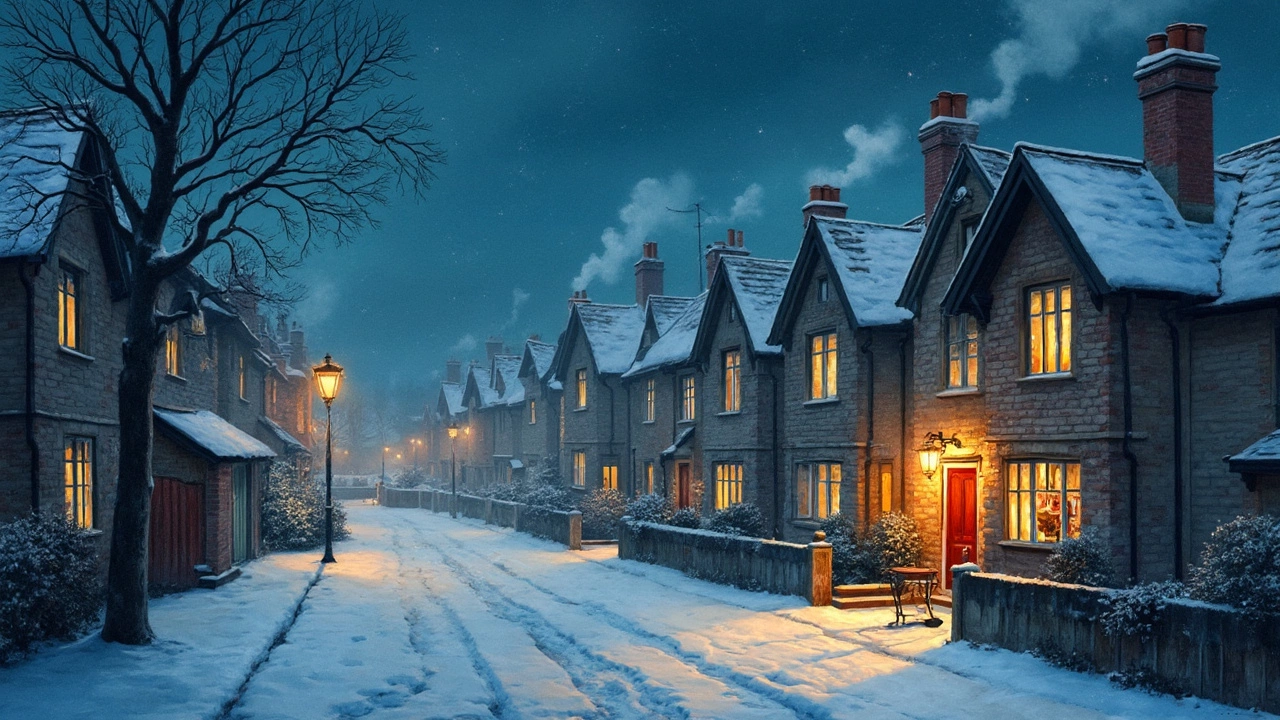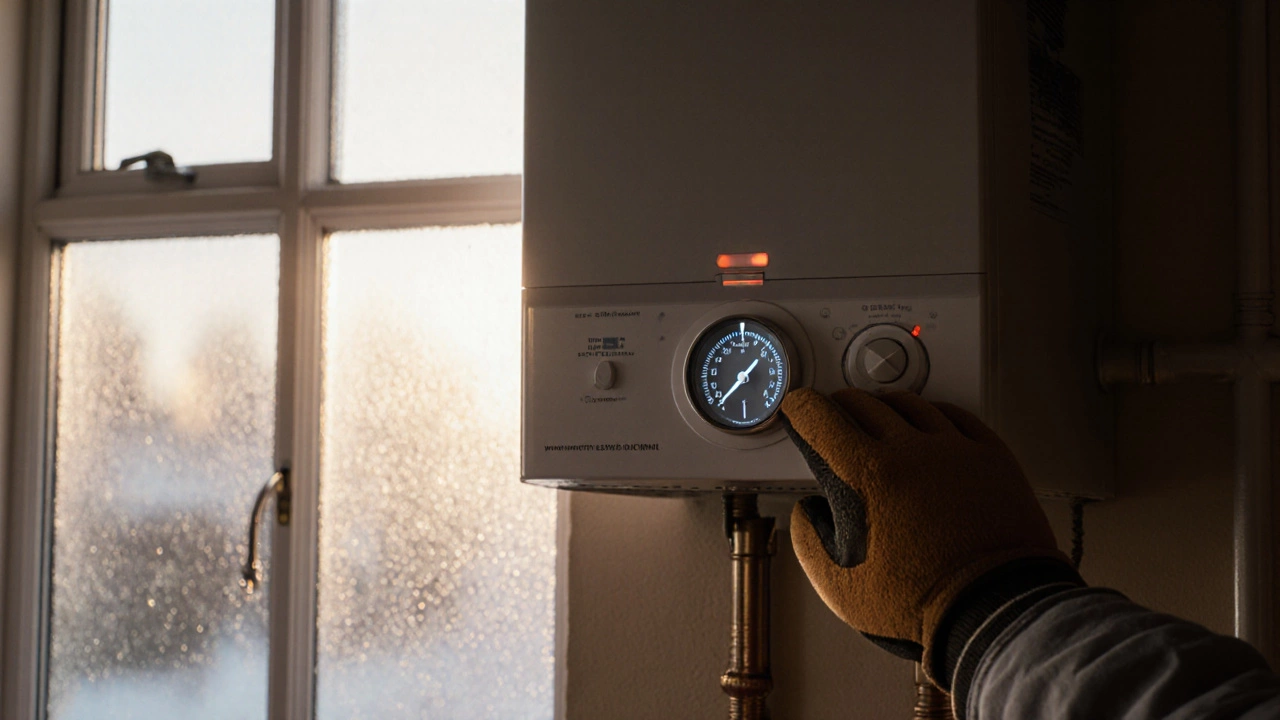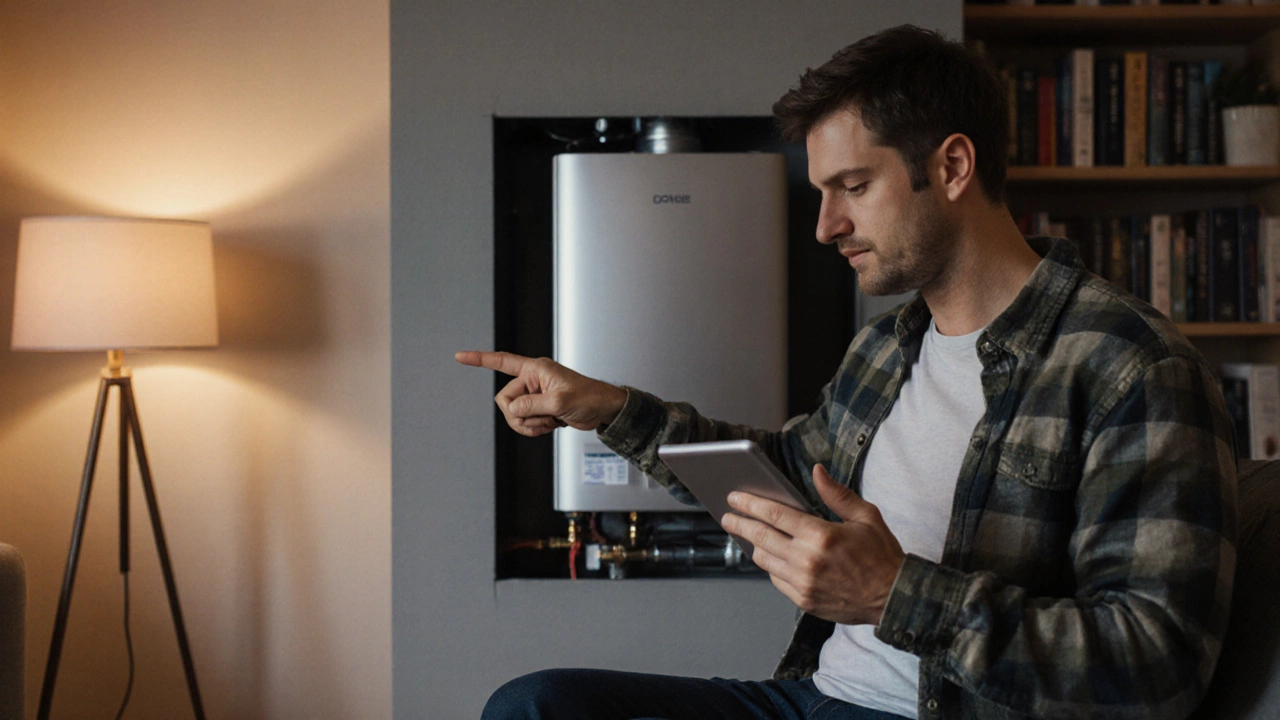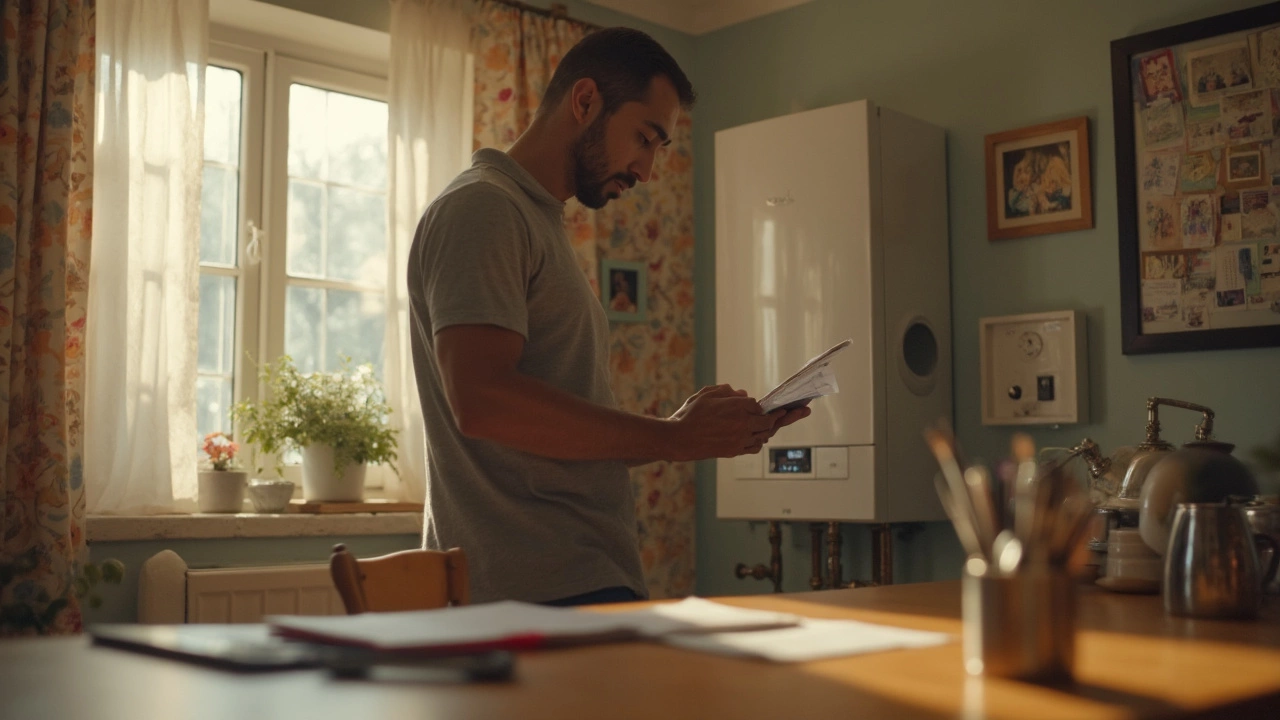
- 16 Apr 2025
- Gideon Thornton
- 0
Ever had that moment where you're standing in your kitchen, and it suddenly hits you – the boiler isn't working quite right? Panic sets in, and you're left thinking, 'How much is this going to cost me?' You're not alone. Figuring out the price of boiler repairs can feel like cracking a code sometimes.
First off, let's talk about the basics. A straightforward repair might not burn a hole in your pocket. Fixing simple problems like a thermostat issue or a minor pipe leak can hover around £100 to £150. But, if things get more complex, like a fault in the heat exchanger or the need for a new circuit board, you could be looking at upwards of £400.
What really influences these costs, though? Let's break it down. The type of boiler you have plays a big role – older models might be trickier (and pricier) to fix. Then there’s the timing – repairs during the winter might cost more simply because engineers are swamped with calls. And don't forget where you live can make a difference too; it’s usually steeper if you’re in a big city compared to a smaller town.
- Understanding Basic Repair Costs
- Factors Affecting Repair Costs
- How to Get a Fair Quote
- Common Boiler Problems and Solutions
- Routine Maintenance Tips
- When to Consider a Replacement
Understanding Basic Repair Costs
Alright, so let's dig into what you might actually be forking out when your boiler starts acting up. The basic cost for boiler repair can vary based on what's broken and the type of boiler you've got. Common, simple fixes, like a thermostat replacement, might set you back around £100. But for something more serious, like a malfunctioning pump or a fan, that price can jump to about £250.
Let's dive into a bit more detail with a handy breakdown:
- A new thermostat: £100 - £150
- Fixing a minor leak: £100 - £200
- Replacing a valve: £100 - £200
- Pump repairs: £150 - £250
- Fan replacement: £200 - £300
If you've got a combi boiler or a more modern system, those parts might be a bit pricier because of the tech involved. Older boilers can be costly too, since parts can be harder to find.
Now, it's not just parts and labor that can affect the cost. Sometimes the prices go up simply because the engineers are in high demand. Think middle of winter, everyone's cranking up the heat – that's when folks discover their boiler's not behaving.
To make it simpler, here's a quick table that sums up those costs:
| Repair Type | Estimated Cost (£) |
|---|---|
| Thermostat | 100 - 150 |
| Minor Leak | 100 - 200 |
| Valve | 100 - 200 |
| Pump | 150 - 250 |
| Fan | 200 - 300 |
So, there you have it—a straightforward look at the basic costs you might face. Knowledge is key in these situations, helping you budget for fixes without any nasty surprises.
Factors Affecting Repair Costs
So, what’s really driving up those boiler repair costs? It's not a simple answer, but understanding the key factors can help you prepare and even save a bit. One of the biggies is the type and age of your boiler. Older models often require parts that are harder to find – and that means more cash out of pocket. Plus, older systems can be trickier to work on, so the labor might cost more.
Next, think about timing. Yeah, timing. If your boiler decides to throw a tantrum in the depths of winter, repair services are in high demand. It's like trying to book a last-minute holiday during the school break – expect to pay more.
Where you live can also impact costs. For instance, in bustling cities like London, repair fees might be heftier compared to a quieter place like Durham. It's all about the cost of living and availability of engineers.
And then there’s labor cost. A seasoned pro might charge more per hour than someone new to the game, but they might also knock out the job quicker, balancing things out.
We can't forget about the parts needed for the fix. Some pieces, like a new heat exchanger, are naturally pricier. I mean, it’s basically the heart of your boiler!
Finally, regular maintenance – or lack thereof – plays a role. Regular check-ups might seem like a pain, but they can catch small issues before they balloon into costly repairs.
| Factor | Impact on Costs |
|---|---|
| Boiler Age | Older systems may increase costs due to rare parts and complex repairs. |
| Time of Year | Repairs in winter can be pricier due to high demand. |
| Location | City repairs usually cost more than in rural areas. |
| Labor and Parts | Experienced engineers and expensive parts raise costs. |
How to Get a Fair Quote
Getting a fair quote for fixing your boiler doesn’t have to feel like you're negotiating a peace treaty. Here’s how you can make sure you’re not overpaying, and that you're getting solid information from your service provider.
First things first, always get multiple quotes. This simple step can open your eyes to what’s reasonable for your particular issue. Aim for at least three from different reputable companies. Don’t just go for the cheapest one, though; consider what each quote includes.
Next, make sure you're clear on what the quote covers. Some companies might offer you a low initial price but add on additional charges later for parts or labor. Asking for an itemized quote can help a lot. It'll show you where every penny is going. Don’t be shy to question anything that seems off or surprising in the quote.
Another good tip is to ask about call-out fees. Some companies charge them, others don’t. Knowing this can help you avoid unexpected charges just for having someone come over to take a look at the problem.
- Check for warranties: See if the repair work comes with any sort of warranty or guarantee. It could save you from shelling out more cash if something were to go wrong shortly after the repair.
- Look for reviews or recommendations: A good word from someone you trust or solid online reviews can point you toward companies that won't take you for a ride.
Also, consider the time of year you're calling. The dead of winter can sometimes mean higher prices just because of demand. Timing it right can sometimes help in getting a fairer quote.
If you’re doing any online research, be wary of average costs. While they can give you a ballpark, they don't account for unique factors like your specific boiler type or extent of the issue.
By following these tips, you should be able to navigate the often confusing world of quotes and feel confident in your chosen repair service. With a bit of homework, you can ensure you're not paying more for boiler repair costs than you absolutely have to.

Common Boiler Problems and Solutions
So, you're probably wondering what's GOING wrong with that boiler of yours. It's not uncommon for things to act up now and then. Let’s dive into some of the usual suspects and how to tackle them.
First up, no heat or hot water. Quite the issue, especially during freezing temperatures! This could be down to diaphragm issues, thermostat problems, or valve failures. You'll want to first check the thermostat settings and see if anything needs adjusting. If the thermostat is fine, then it may be best to call in a pro to explore further.
Next, there's leaking and dripping. This is generally a red flag indicating a broken component, be it a pressure valve or a pump seal. Leaks are usually better handled by an experienced engineer to prevent further damage or water wastage.
If you hear strange gurgling, whistling, or banging noises, it might feel like your boiler is throwing a fit. Often, air in the system or low water pressure can cause these noises. It's a great idea to bleed your radiators and see if it helps. Otherwise, professional help might be your next step.
Then there's the dreaded pilot light going out. Annoying, right? The thermocouple might be damaged or blocked, or there could be a draft affecting the flame. You can try reigniting it, but if the issue persists, consider seeking a repair service to dig deeper.
Finally, loss of pressure is a common hiccup. Your boiler's usually at optimal performance with a gauge reading around 1.5 bar. If it's below that, there might be a leak somewhere or the system has been recently bled. To fix this, you might need to repressurize the boiler or have a professional check it out.
At times, the most frustrating part isn't even the repair itself but figuring out when it's worth solving or just biting the bullet and getting a new one. Regular maintenance can often nip these issues in the bud, so keep those routine checks up-to-date!
Routine Maintenance Tips
Want your boiler to last longer and avoid those unexpected repair bills? Regular maintenance is the key, and it's not as complicated as it might sound. A little effort now can save you a lot of hassle (and money) down the line.
First things first, make it a habit to service your boiler at least once a year. This isn't just for peace of mind; it's actually recommended by most manufacturers to keep your warranty intact. Hiring a professional for an annual check-up helps spot any budding issues before they become a full-blown crisis.
Add a quick check of your boiler pressure to your routine. Your boiler’s pressure should be between 1 and 1.5 bar when it's cool. If it's too low, your boiler won't run efficiently. Too high, and you might be looking at leaks. Adjusting this is usually as simple as turning a valve, but always consult your manual or a pro if you're unsure.
Also, don't neglect the radiators. Every now and then, turn them on full blast to see if they heat evenly. If they have cold spots, it's time to bleed them. Use a radiator key to release trapped air – you’ll probably hear a hiss and a bit of water might come out. Keep a cloth handy!
Water quality is crucial, too. Consider using an inhibitor to prevent sludge buildup. Sludge can cause blockages, which lead to poor system performance and can jack up boiler repair costs.
Check the pilot light regularly on older boilers. It should burn blue. If it's yellow, there might be a problem with the gas combustion, and it's best to call in a qualified engineer.
If you’re a fan of gadgets, a smart thermostat can be your best friend. It helps you monitor your system's efficiency and can even catch issues early by tracking unusual patterns in heating behavior.
Got a combi boiler? Running your hot taps once in a while to keep them from seizing up can really help.
| Maintenance Task | Frequency |
|---|---|
| Annual service by a professional | Once a year |
| Check boiler pressure | Monthly |
| Bleed radiators | Every few months |
| Inspect pilot light | Monthly |
| Flush system inhibitor | Every 5 years |
By ticking off these simple tasks from your checklist, you can keep your boiler humming happily and your home comfortably warm, without any nasty surprises.
When to Consider a Replacement
Alright, so you've been nursing that old boiler along for years, but when does it make sense to just throw in the towel and get a new one? It's a big decision, right up there with buying a car or deciding if pineapple belongs on pizza (it doesn’t, by the way).
First off, age is a huge factor. If your boiler is over 15 years old, it's like running a marathon with a pair of shoes you bought in '98. Efficiency has come a long way, and a new boiler can cut your energy bills by up to 30%.
Next, consider the frequency and cost of boiler repair. If you're calling the repair guy out more often than your old uni mate, it’s time to do some maths. Add up those repair costs over a year. If they start to rival the price of a new boiler, it's time to make the switch.
Another hint it's time to replace is if you're dealing with hot and cold water cycles. One minute you're enjoying a warm shower, the next it's like the Antarctic. A new boiler will help you say goodbye to that nonsense.
Take a look at your boiler's rating, too. There's a chance it's not as efficient as it could be. New boilers often come with an 'A' rating. Anything below a 'C'? That's a red flag.
- Age over 15 years
- Frequent repairs
- Fluctuating water temperature
- Low efficiency rating
Replacing an older boiler can be a bit pricey upfront, usually ranging from £1,500 to £4,000, depending on the type. But think of it this way – long term savings on energy bills are like extra money in your pocket!




